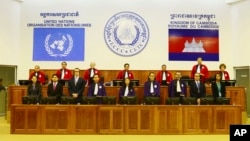Observers of the UN-backed Khmer Rouge tribunal say the court should have a clear plan for ending proceedings and to address longstanding concerns.
Last month Council Minister Sok An met with the UN’s top diplomat for legal affairs, Stephen Mathias, to discuss the work of the court.
But Long Panhavuth, a longtime tribunal observer, says while the two discussed funding for the court, they failed to reach an agreement on how the court should handle two outstanding cases. It remains unclear whether those cases will be tried, or what would become of them if the tribunal shut down its operations after the current trial of two aging leaders, Nuon Chea and Khieu Samphan.
“It is regrettable that the UN didn’t mention this issue for in-depth and transparent discussion,” he said. “We can see the fact the UN has failed time and again in solving the issue. We think that in the future, [cases] 003 and 004 cases are bound to fail.”
Latt Ky, a tribunal observer for the rights group Adhoc, said he was concerned about the current case, 002, and whether it will end. “If so, when?” he asked. “How will compensation be arranged? So far the compensation arranged by the tribunal has not been meaningful enough to the victims.”
At the same time, a lack of funding for the court has shown a lack of sincerity to the public, he said. “So far, the public does not know clearly about the future plans.”
Ek Tha, a spokesman for the Council of Ministers, told VOA Khmer it has confirmed its commitment to move forward with funding for the court. “We hope that the measures set about will provide stability for the court in 2016,” he said.
Civil party plaintiff Sum Rithy, a Khmer Rouge survivor, said he wanted the court to be a venue to tell stories and show evidence in court of the atrocities committed by Khmer Rouge security and torture centers. “I am determined, for as long as I am alive, to seeking justice for all the victims, as well as myself, and also the innocent lives that were lost and the pain suffered during the regime,” he said.
The tribunal, backed by the United Nations, was supposed to help do that, to provide accountability and find justice, he said. “If we don’t find justice for the victims…the court will not carry any meaning.”
The court has made some progress on Case 003. The international investigating judge at the court on Monday issued atrocity crimes charges for Meas Muth, a former Khmer Rouge navy commander, including genocide and crimes against humanity.







